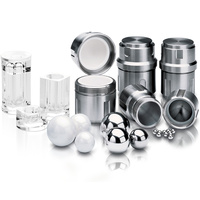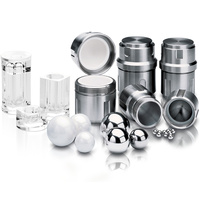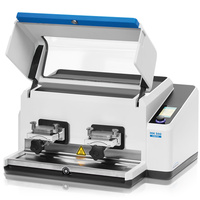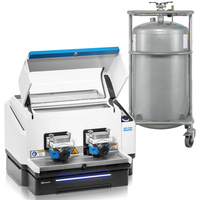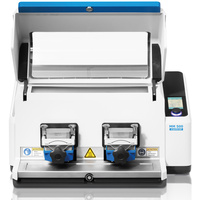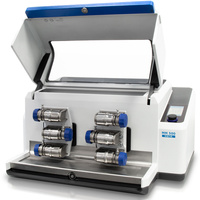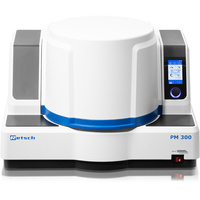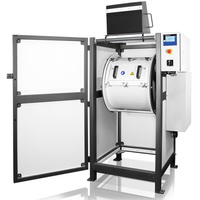Retsch Vibrating Mill MM 400, 100-240 V, 50/60 Hz
A true all-rounder
The Vibratory Mill MM 400 is a true all-rounder, developed for dry, wet and cryogenic grinding of small sample quantities up to 2 x 20 ml. It mixes and homogenises powders and suspensions at a frequency of 30 Hz within seconds - unbeatably fast and easy to operate.
The compact tabletop unit is suitable for classical homogenisation processes as well as for biological cell disruption for DNA/RNA and protein extraction. With a possible grinding time of up to 99 hours, the MM 400 is particularly suitable for use in research, for example in mechanochemistry.
In terms of performance and flexibility of this mill, there is no comparable technology on the market.
Performance and design
- Powerful grinding by impact and friction at up to 30 Hz
- Two grinding stations allow preparation of up to 20 samples per run
- 12 Standard Operating Procedures (SOP) and 6 cycle programmes can be stored in memory
- Convenient touch display, significantly quieter in operation
Great versatility
- 3 different grinding methods: dry, wet, cryogenic
- Mixing of powdered sample and binder in a plastic cup in preparation for tablet pressing, e.g. for XRF
- Suitable for research applications in the field of mechanochemistry or for biological cell disruption by bead beating
- Extraction of pesticides (QuEChERS) and plant ingredients
Reproducible results thanks to calibration
Reproducibility plays an important role in the process chain from sampling to analysis. Laboratory instruments that can be calibrated guarantee permanently reproducible results with minimal standard deviation. This is particularly useful when comparing results from different sites. The MM 400 is the first calibratable laboratory mill; time and frequency are already calibrated on delivery. RETSCH offers a regular calibration service to ensure reproducible grinding processes. This functionality is particularly suitable for
- Testing laboratories with different locations
- Accredited laboratories according to ISO/IEC 17025 or ISO 9000ff
- Pharmaceutical products
Solutions for biological applications and cell disruption
Vibrating mills are often used for the homogenisation of biological samples. Bead beating with small glass beads is an established method for cell disruption of yeasts, microalgae or bacteria. The sample heats up only moderately, which can be reduced to a minimum by pre-cooling.
The mill enables efficient cell disruption of max. 240 ml cell suspension for DNA/RNA and protein extraction. It also allows intact bacteria to be isolated from tissue for correct diagnosis of infections. By means of adapters, eight 30 ml bottles or ten 5 ml vessels can be used for this purpose.
Adapters for disposable vessels with the following capacities are available for the MM 400:
20 x 0.2 ml / 20 x 1.5 or 2 ml / 10 x 5 ml / 8 x 30 ml / 8 x 50 ml.
Conical centrifuge tubes are ideally suited for pulverising 25 to 30 g of plant material, such as cannabis flowers. Up to 8 tissue samples, such as fresh liver in buffer solution, can also be homogenised in such 50 ml tubes with balls made of steel or zirconium oxide. In order to keep the mechanical stress on the tubes as low as possible, it is advisable to reduce the frequency and to use a higher filling level, e.g. with buffer solution and sample material.
Solutions for cryogenic grinding
With the cryokit, RETSCH offers a cost-effective solution for carrying out cryogenic grinding in the MM 400 vibrating mill. The set consists of two insulating containers, two grinding bowl tongs and protective goggles.
The sample to be embrittled is filled into the stainless steel grinding bowl together with the grinding ball, then the bowl is screwed tight. The embrittlement takes place indirectly during the pre-cooling of the grinding jars in the liquid nitrogen bath. After about 2 minutes the sample is sufficiently cooled for cryogenic grinding.
Applications in mechanochemistry
Mechanochemistry enables fast reactions of substances in a solvent-free environment. Here, some chemical reactions require the frictional forces of a planetary ball mill, while other types of reactions require energy input by impact - this is where the MM 400 vibrating mill comes into play.
For applications in research, often only small sample quantities are available, for which grinding bowls of up to 50 ml, as available for the MM 400, are advantageous. The possibility of programming process times of several hours is also an important aspect due to the often long reaction times.
In mechanochemistry, vibrating mills offer a unique advantage over planetary ball mills: The use of transparent buckets in combination with the typical horizontal movement of the buckets allows the use of in-situ RAMAN spectroscopy. This enables the observation of the reaction process over time, e.g. to determine the process time with the maximum yield and thus avoid long process times.
The MM 400 offers many advantages for mechanochemical applications:
- Process run times of up to 99 hours
- Different grinding bowl sizes and materials
- Transparent PMMA grinding jars allow in-situ RAMAN spectroscopy
- Programming of frequency and pause times
- Adapter for 4 x 5 ml stainless steel grinding jars allows up to 8 simultaneous reactions
Typical sample materials
RETSCH vibrating mills are true all-rounders. They homogenise e.g. waste, soil, drugs, electronic scrap, ores, grain, tissue, glass, hair, wood, ceramics, sewage sludge, bones, coal, coke, plastics, alloys, minerals, paper, plant parts, straw, tobacco, tablets, textiles, pet food, wool, chemical products, oil seeds, and many more.
Functional principle
The grinding balls of the MM 400 perform circular oscillations in a horizontal position. Due to the inertia of the balls, they strike the sample material located on the rounded end faces with high energy, causing it to be comminuted. Due to the cup movement and the motion of the balls, intensive mixing takes place at the same time. The degree of mixing can be further increased by using several small balls. When using many small balls (e.g. glass beads), biological cells can also be disintegrated, for example. In this case, the large frictional impact effect between the balls ensures effective cell disruption.
With quick-clamping device (please order grinding bowls and grinding balls separately).

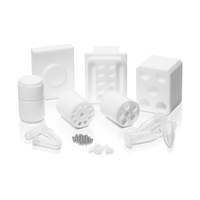 Details
Details
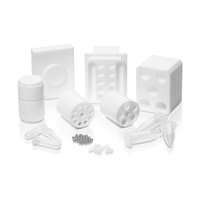 Details
Details
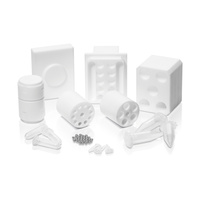 Details
Details
 Details
Details
 Details
Details
 Details
Details
 Details
Details
 Details
Details
 Details
Details
 Details
Details
 Details
Details
 Details
Details
 Details
Details
 Details
Details
 Details
Details
 Details
Details
 Details
Details
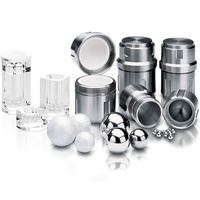 Details
Details
 Details
Details
 Details
Details



















